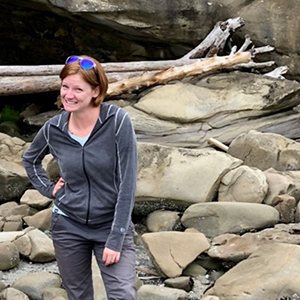
Jenn Pickering
Geologist, Shell
Geology is the only career I could think of that had the potential for so much travel to beautiful places, the ability to spend so much time away from the office, and still pays the bills!
What Organization do you work for?
Shell
What is your official title and what would you call yourself (geologist, hydrologist, geochemist, environmental scientist, etc.)?
At Shell I am a “Clastics Geologist” — but I call myself a sedimentologist / stratigrapher / geomorphologist, depending on who’s listening!
What attracted you to the field of geosciences?
Geology is the only career I could think of that had the potential for so much travel to beautiful places, the ability to spend so much time away from the office, and still pays the bills! Plus it’s such a broad field that I don’t think it’s possible to get bored with it; there’s always something new to learn. And the job security is not bad!
What do you do at your job day to day?
I’m in the Research & Development part of Shell, and I split my time mostly between 3 things:
- internal “Subject Matter Expert” consulting (I’m 1 of 2 “clastics” experts) – if the geology of a particular area is really complicated, they call my team in to help; this means I get to do very academic work like looking at sediment cores and seismic geomorphology, e.g., and I usually partner with a structural geology expert or another subdiscipline
- developing predictive technologies – since Shell is so huge, we have a huge amount of data available to us (more than our employees could ever analyze), so my team tries to develop software, apps, and plugins that help other non-research geologists in the company understand their systems quickly, e.g., we make statistical databases that generate predictive scaling metrics and machine learning-based automated facies interpretations from core images
- providing “steer” to the extramural research projects that we fund through various academic institutions – this means I travel to universities or their fieldwork areas and get updates on what they’re working on, and I try to influence them to work on things that will be beneficial to Shell
What do you enjoy most about the work you do?
I get to spend a fair amount of time in the field and at conferences, and my job is pretty academic and laid back (compared to the “asset geologists” that work to find and produce hydrocarbons).
What about your job do you find most challenging?
I often present to high level management, which means I have to dress up and pretend to be a businesswoman. I don’t like wearing fancy clothes! Also, there is a lot of bureaucracy to deal with because it’s such a giant corporation, so it can take a long time to affect change.
If you could go back and give your college self one piece of professional advice, what would it be?
I would definitely tell myself to do multiple summer internships. I only did one, and I’m lucky it led to a job offer, but if I had done more summer internships I would have more experience, possibly more options at graduation, and I wouldn’t have been so broke in grad school!
Has has being a geoscientist changed the way you view the world around you, and if so, how?
I think being a geoscientist has given me a better sense of awareness and perspective. For example, I think about a lot of different problems in many different parts of the world over different spatiotemporal scales and at different depths within the earth – it’s really important to orient yourself within those details when you start a new project, and just the exercise of orienting yourself in such different environmental circumstances over and over again expands your perspective. Not to mention, getting to travel to different places all over the world really expands your cultural horizons too.